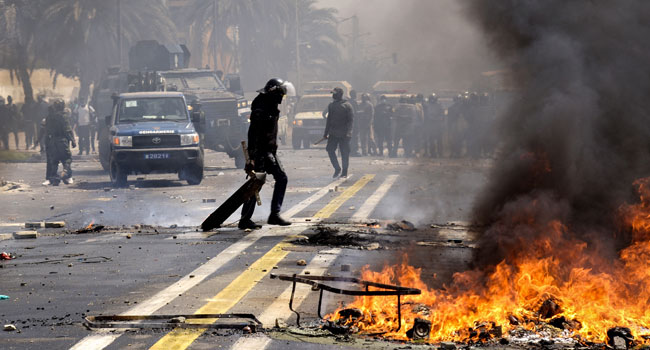In a sudden turn of events, Senegal finds itself embroiled in political turmoil as clashes erupt between opposition party supporters and law enforcement in the capital, Dakar. The cause of the unrest stems from President Macky Sall’s unexpected announcement of the indefinite postponement of the presidential election scheduled for February 25, triggering widespread international concern.
A Nation in Limbo
President Sall cited a dispute between the National Assembly and the Constitutional Court over the rejection of candidates as the reason for his intervention, leaving the nation in a state of uncertainty. The investigation into the integrity of two Constitutional Council judges involved in the election process further deepens the political crisis.
Senegal Grapples with the Aftermath
Responding to the call of opposition candidates, a diverse crowd gathered in Dakar to express their discontent. The peaceful demonstration escalated into chaos as police deployed tear gas, prompting protesters to retaliate by throwing rocks. The clash paints a vivid picture of a nation caught in the throes of political unrest.
Presidential candidates, defying the official postponement, declared the launch of their campaigns on the same day. The RFM opposition party categorically rejected the delay, vowing to mobilise the Senegalese people for a defiant march. Opposition figures, including former mayor Khalifa Sall, called for unity among pro-democratic forces to confront what they deem a constitutional coup.
Global Entities Urge Prompt Rescheduling of the Vote
The international community, including the United States, the European Union, and France, issued appeals for the swift rescheduling of the presidential election. Expressing concern, they emphasised the importance of a prompt, transparent, inclusive, and credible election to restore stability in a region that has recently witnessed political upheavals and coups.
Senegal, traditionally considered a beacon of democratic stability in West Africa, faces a severe test as this marks the first time a presidential election has been postponed. The move challenges the nation’s democratic reputation in a region grappling with political instability.
Amid the chaos, opposition leaders, including Thierno Alassane Sall, accuse President Sall of “high treason towards the Republic” and call for resistance. The exclusion of key candidates, such as Ousmane Sonko and Karim Wade, adds fuel to the fire, with critics claiming that the election delay is tantamount to a cancellation.

Candidates and Controversies
President Sall had designated Prime Minister Amadou Ba as his successor, but internal party divisions raised doubts about his chances in the election. Notably, imprisoned candidate Bassirou Diomaye Faye emerges as a potential winner, highlighting the contentious nature of the electoral process.
The National Assembly, including members from Sall’s own party, passed a motion calling for a parliamentary inquiry into the alleged partiality of two judges on the Constitutional Court. This further complicates the political landscape, adding another layer to the ongoing crisis.
As Senegal grapples with the aftermath of the postponed election, the nation stands at a crossroads, navigating through political unrest, international pressure, and the quest for a democratic resolution to the crisis.


